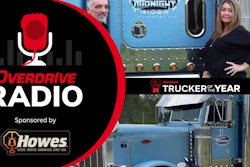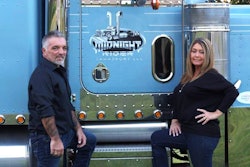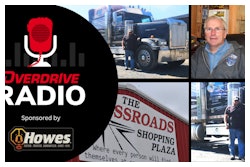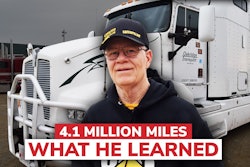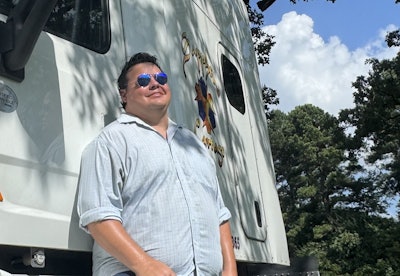
Sapphire Cartage owner-operator Scott Smith, today with two 2017 Peterbilt 579s powered by Paccar MX13 motors, has been hauling rice, various grains, meals, dried peas and all manner of freight in a hopper bottom trailer for years. That is, he'd been running hopper up until the last several weeks, when he hooked to a 1995-model flatbed for sale from another local owner for a two-week trial run booking his own platform loads.
"I've done flatbed work before," he noted of his now decade and a half, give or take, trucking in one form or another. He felt he was ready for the change, given the outlook for hopper-bottom freight. "Rates for hoppers went downhill recently," he said, with a principal broker he'd been using for freight outbound and back to his area. (The business is headquartered in Searcy, Arkansas.)
He could see the decline and what it meant for profitability with crystal clarity, using a custom spreadsheet he and his wife, Stephanie, built to better analyze hopper work's per-ton rates paid to the business on a per-mile and lump-sum basis. Likewise: To better account for ongoing fixed-plus-maintenance expenses -- based on Sapphire's $1,600/month average for 2024, rounded up to $1,750, Smith said, just to be safe. There's a column for fuel outlays, too, fairly simply tracked with the owner-operator's use of the Mudflap application for mobile payments and fuel discounts at network truck stops in his area and along routes. (Smith's keen on analyzing fuel prices minus the tax that's reflected in the pump price, and often finds high-fuel-tax Illinois among states on his routes with some of the cheaper actual fuel pricing.)

[Related: Fuel taxes: Finding the cheapest fuel about more than the pump price]
The spreadsheet's set up to track expenses and profits weekly, with a $1,500/week owner's draw built in over and above the $1,750 weekly expense set-aside and fuel expense for the business. As profits over and above that bottom line week-to-week kept dwindling, the flatbed opportunity looked promising.
As with the positive 2025 experience of April Trucker of the Month and longtime flatbedder George Kincaid, owner-operator Scott Smith has quickly seen a boost in revenues, even just dipping his toes into platform-freight waters via load board subscriptions, and getting set up with new brokers.
"According to my spreadsheet for the last few weeks with the hopper," he said early this month, "$2.20 per mile was my highest" weekly rate. With the first two flatbed weeks under his belt, the figure was $2.70/mile. There's trade-offs, he knows, with that more physical work, but he feels it's worth it.
Earlier this month, Smith was set up for the flatbed purchase. "We'll pay cash for it," he said, the owner asking $9,000. With Smith's trucking success these past couple years, even with setbacks, "we're finally in a place to do that."
Smith's Sapphire Cartage is Overdrive's Trucker of the Month for June, putting the owner-operator in the running for the 2025 Trucker of the Year award.
 Overdrive's 2025 Trucker of the Year competition, sponsored by Commercial Vehicle Group and Bostrom Seating, recognizes business acumen and unique or time-honored recipes for success among owner-operators. Nominations are open for exceptional owner-operators, whether leased or independent. Nominate your business or that of a fellow owner (up to three trucks) via this link for a chance to win a custom replica of your tractor and a new seat from Bostrom and CVG.
Overdrive's 2025 Trucker of the Year competition, sponsored by Commercial Vehicle Group and Bostrom Seating, recognizes business acumen and unique or time-honored recipes for success among owner-operators. Nominations are open for exceptional owner-operators, whether leased or independent. Nominate your business or that of a fellow owner (up to three trucks) via this link for a chance to win a custom replica of your tractor and a new seat from Bostrom and CVG.
Strength in diversification
Owner-operator Scott Smith's trucking career has seen him hauling frac sand in the oil fields, running a dump truck, pulling flatbeds, bulk tankers and hoppers and a good bit in between. His recent moves to add the flatbed trailer offer a chance at diversification in the present. He's still got his 2020 hopper trailer, after all, ready for service when the iron is hot.
He's the owner of more than one working Class 8 tractor, too, but he's not rushing to hire a driver, that's certain. "I like the one as a backup when this one goes down," he said about his purchased pair of 2017 579s. He bought them in 2023, after his prior truck was involved in a partial brake failure-attributed accident that was the result of a mix of rough roads and pure bad luck, with loss of air to the drive axles compromising his stopping distance such that he was forced to wedge the tractor between a highway-construction-zone barrier and a stopped FedEx trailer ahead of him at fairly low speed. He wasn't ultimately cited in the accident after investigations. "I had air going to the the steer axle," Smith, and "air going back to the the trailer brakes, but I had no air going to the four brakes on the drive axle."
He'd just had the brakes serviced a few weeks prior, in fact. He doesn't fault the mechanic he works with, though, and wonders whether the problem appeared in-transit the very day or slightly prior to the accident, in any case, with rough roadways in Indiana particularly on the day in question coming back into Illinois toward home.
Smith today continues to rely on local mechanic Donald Johnson for most of his needed repairs, rather than risk what he's seen other owner-operators get caught up in trying to do too much themselves on weekends and/or all available downtime generally. Namely, that's burn-out.
Too many owners, he feels, "don't get any time off. Then don't spend any time with their family. If families suffer, marriages suffer and their work suffers" as they burn out. "You might not get everything done on the weekends. ... You might not have all the tools to do everything that needs to be done. So I've got a mechanic that handles all of my repairs, maintenance and everything. It's just easier, less of a headache that way."
He sticks to a conservative 15,000-mile oil change interval, and has gotten into a rhythm with service working with Johnson, who has a "few of his own trucks," likewise a feed mill, Smith said. "Everything he’s done is just good work." While it’s "been a little bit of a learning curve with the electronics" on newer engines for both Smith and Johnson with the 579s, "we have a pretty good relationship. We kind of work hand in hand on ... troubleshooting."
A second pair of eyes on the entire truck and trailer is invaluable, too. Scott Smith knows that particularly well after the accident. "I can’t tell you how many times I’ve brought it in for an oil change" only for Johnson to flag another item for repair, he said. "It's a great way to have a second set of eyes on it. Everybody’s a victim of a normal pre-trip" and the rhythm and routine of it. With that, sometimes you "don’t inspect little things as much as you should."
[Related: Prospects for a 'phenomenal' flatbed year: Trucker of the Month George Kincaid]
 Scott and Stephanie Smith are pictured with Scott's third truck, as it were. "My business pickup truck isn’t some new flashy $80,000 tax writeoff," he said. It's this fully restored 1987 Chevy dually. "I’m not making truck payments on a truck I rarely drive," nor paying for expensive insurance on a "new truck that’s going to be just average in a few years." It's capable of towing one or another of the 579s, too, "if they break down. And it should hold its value forever, basically."
Scott and Stephanie Smith are pictured with Scott's third truck, as it were. "My business pickup truck isn’t some new flashy $80,000 tax writeoff," he said. It's this fully restored 1987 Chevy dually. "I’m not making truck payments on a truck I rarely drive," nor paying for expensive insurance on a "new truck that’s going to be just average in a few years." It's capable of towing one or another of the 579s, too, "if they break down. And it should hold its value forever, basically."
The trucks haven't been 100% trouble-free, yet downtime is the real killer with maintenance issues, he well knows. "When one breaks down, I swap to the other and keep going, barely missing a beat," Smith said.
Smith's good friend and owner-operator colleague James Campbell was skeptical of the two-truck-purchase move, but acknowledges it's "all working out," Campbell said. "It’s a juggling act" running a small business, but "he’s doing good." Campbell and Smith check in "pretty much weekly," Campbell added, and Smith's clearly learned from him.
He bought his prior 2010 Kenworth truck and then-nearly-new 2020 hopper from the longtime owner, too, taking over payments on the latter after working a deal with the finance company to add himself as a co-signer on the loan. Smith's been running OTR outbound and back from his Arkansas home base ever since. Hopper freight's taken him as far East as Pennsylvania but usually no farther than northeast Indiana, South into Texas quite a bit, out to Northwest Kansas and other spots across the middle of the country.
"Always on-time," said DeltARK broker Ryan Womack. "Everybody has hiccups from time to time, but if he did" he communicated effectively and "everything got done on a timely manner. He's a great driver."
Business-wise, Womack's seen clearly a meticulous attitude toward paperwork in Smith, too, "making sure everything got sent to us," he said. "Scott was always very professional in all my dealings with him."
The four-to-five-year run of that work to date follows experience that stretches back to time in a factory when Smith, a couple years shy of 40 today, was working in a local factory and jumped ship to the oil fields, then joining a former coworker in his dump trucking business.
 All in the family: Pictured are the two Sapphire Cartage 579s and Scott Smith's 1987 Chevy dually, likewise the entire family, who've been involved in the trucking business in various ways through the years. Tanner (14) is the youngest hanging off the left truck, DJ (15) in the bed of the pickup, Avery (20) behind the hood of the truck. Jasmine (17) stands with the rig on the right. All at various times rode along with Smith, and helped getting the recently acquired flatbed road-ready. The old DOT reflective marker on the 1995 model was 30 years old and showing its age, as it were. "They got together with DJ on my big wire brush grinder," Smith said, "followed by Tanner with my wire brush in a drill, followed by Jasmine with alcohol and a rag and they stripped that old one off in no time. We put the new one on." All have learned tarp folding, strap placement, corner protection, how to use chains and more. And while Smith doesn't "expect them to go into trucking when they get older," he's careful to talk them through any process new to them. "Even something as simple as, 'I roll the straps up this way, with the hook facing this direction, so when I hook it and throw it, see how it unrolls,' letting them see firsthand how planning and prep can make the actual work easier. Hopefully that translates into other areas of life."
All in the family: Pictured are the two Sapphire Cartage 579s and Scott Smith's 1987 Chevy dually, likewise the entire family, who've been involved in the trucking business in various ways through the years. Tanner (14) is the youngest hanging off the left truck, DJ (15) in the bed of the pickup, Avery (20) behind the hood of the truck. Jasmine (17) stands with the rig on the right. All at various times rode along with Smith, and helped getting the recently acquired flatbed road-ready. The old DOT reflective marker on the 1995 model was 30 years old and showing its age, as it were. "They got together with DJ on my big wire brush grinder," Smith said, "followed by Tanner with my wire brush in a drill, followed by Jasmine with alcohol and a rag and they stripped that old one off in no time. We put the new one on." All have learned tarp folding, strap placement, corner protection, how to use chains and more. And while Smith doesn't "expect them to go into trucking when they get older," he's careful to talk them through any process new to them. "Even something as simple as, 'I roll the straps up this way, with the hook facing this direction, so when I hook it and throw it, see how it unrolls,' letting them see firsthand how planning and prep can make the actual work easier. Hopefully that translates into other areas of life."
Fast track to business ownership
"My story’s quite a bit different than a lot of folks'" who got their CDL in the first couple decades of this century, Smith knows. There's not exactly a traditional truck driving school in his background, for instance. Rather, clocking in and out of the factory job, the wife of a coworker came in one day and noted the Weatherford oil field services company was having a kind of "career day" or fair. Year 2011, he'd just gotten off work and thought he'd go check it out. The scene he found was strange in some ways. There were people in suits and ties there, but it seemed clear the company was wanting hands and roughnecks.
Smith "grew up doing farm work," he said, was just off work from a factory and looked the part. "One of the Weatherford guys, out of the whole crew of people there," looked right at him and said, "You look like a guy who knows how to run some equipment."
He'd worked an oil rig a few years before, he noted, then: "Do you have a CDL?" the man asked.
He didn't, but the company put him through four weeks of training to get that CDL, then put him to work moving "equipment from job to job," he said. "It came with a pretty good little wage bump," too. "I never had any intention of being a truck driver. The idea of being on the road never appealed to me at all."
Yet he admits he "fell in love with it" in the subsequent weeks. "I started seeing the good side of it," not least the money that could be made, particularly with oil field work at that time.
[Related: From the Archive -- 'Fuel's Gold' amid fracking boom]
Weatherford would ultimately move out of the area, and Smith bounced around among more local oil field services companies, dropping into "the deep end" of tanker work, training at night in low visibility situations with vacuum pumps and other to-him-foreign equipment.
He spent time hauling frac sand where he'd be out on-site or on the road a week at a time. Stephanie "didn't like that," he said. By 2015 he was back out of trucking briefly, selling cars. "I remember the 2015 Ram trucks coming out. One of the guys [working] at the car lot bought a dump truck, then bought a second, and I was the first person he called."
Unlike with a lot of bigger-business owners, this owner was keen to share details of all matters of the business with Smith. "I learned a lot from him" about the basics of ownership, he said, and soon enough purchased a 2000 Mack CH13 dump himself and learned a whole lot more about the business on the fly, with Stephanie providing a huge assist "making sure all the use taxes and other taxes are paid," and so much more.
 Enter your business in Overdrive's Trucker of the Year competition for a chance to win a custom scale replica of your tractor as trophy but also a new seat and/or other perks from program sponsor Bostrom Seating.
Enter your business in Overdrive's Trucker of the Year competition for a chance to win a custom scale replica of your tractor as trophy but also a new seat and/or other perks from program sponsor Bostrom Seating.
That first Mack dump powered Smith forward for a couple of years before a piston essentially "blew apart and seized the engine," he said, and he was back where he started as a company operator, saving for a complete engine rebuild. He was "running from Searcy," where Smith lives in Arkansas, "to Chicago and back," home every other night, a priority for the family to this day.
"We’re big on family time," Smith said. Yet he was "barely making ends meet," he admitted, with savings obligations and ongoing expenses otherwise. That was when he jumped into hopper ownership, likewise purchasing the 2010 Kenworth. And he would become good friends with the banker who helped arrange the deal. As hopper business picked up -- rates, too -- he was able to rebuild the Mack's motor and would ultimately sell it for twice the price he bought it for when equipment got to be in extremely high demand post-COVID.
He also learned he could be the most efficient, the most profitable, responsible only for himself as driver of the business and the truck. Before he sold the Mack dump, "I tried a couple different people to run that truck for me," Smith said, yet "I found out really quickly that the people that are motivated enough to be good employees are already running their own equipment. ... We had more headache trying to find people to run [the Mack even] above market wages -- we were offering 30% of gross," yet "nobody would stick around very long."
He'll keep testing the waters of flatbed freight, utilizing DAT as well as dedicated broker boards like that of ATS and others. With frugality a defining quality of the Smith family, too, he and Stephanie support life with her income and the defined owner's draw from the trucking business. Everything above that can be set aside for the future, which increasingly looks bright. He's particularly hopeful the option of multiple trailer types might deliver better freight stability seasonally, too.
"I have a great broker for the hopper bottom," he said. "If he says there isn't much going on this week," the flatbed "gives us options, so we’re never left holding the bag."
[Related: Back to business: Rufus Morris finds stability, long-term value with leasing partner]

